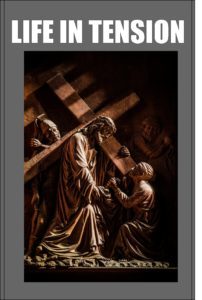Resolve Tension into Identity
 But the meek shall inherit the land and
But the meek shall inherit the land and
delight themselves in abundant peace.
(Ps 37:11)
By Stephen W. Hiemstra
One resolution of life’s tensions is that they are absorbed into our identity, defining our self-image, relationships, and expected actions and reactions. A pastoral identity, for example, implies spending time with God, interpreting scripture, praying with others, preaching the Gospel, and offering comfort to everyone; these activities are expected of pastors and are an essential part of pastoral training. Likewise, training in humility makes us meek, part of our identity as disciples of Christ.
Meekness is Unique
The Third Beatitude is unique to Matthew: “Honored are the meek, for they shall inherit the earth.” (Matt 5:5). Meek means to: “…not [be] overly impressed by a sense of one’s self-importance, gentle, humble, considerate” (BDAG 6132). Meek is like applied humility (poor in spirit)—a character trait of being humble (Guelich 1982, 82), suggested by at least three verses in Matthew:
1. Take my yoke upon you, and learn from me, for I am gentle and lowly in heart, and you will find rest for your souls. (Matt 11:29)
2. Say to the daughter of Zion, ‘Behold, your king is coming to you, humble, and mounted on a donkey, on a colt, the foal of a beast of burden. (Matt 21:5)
3. And the high priest stood up and said, Have you no answer to make? What is it that these men testify against you? But Jesus remained silent. (Matt 26:62-63)
In these three events—Jesus’ invitation to discipleship, his humble parade into Jerusalem, and his silence while on trial—Jesus exhibited his meekness. Sedler (2003, 92) observes that “anything Jesus said [at his trial] would have been twisted, turned, and rejected.” Jesus’ meekness is also observed in the writings of the Apostles Peter, James, and Paul (e.g. 1 Pet 3:13–17, Jas 1:21, and 2 Cor 10:1).
Honor and Meekness
In his writing, Neyrey (1998, 181–182) describes honor in meekness in these terms:
It can indeed be understood as grounds for praise for refusing to be a victim…according to the choreography of honor challenges, the ‘meek’ person could be one who makes no honor claims (e.g. Matt 21:5), or, more likely, one who does not give a riposte [response] to challenges and does not respond in anger to insults. In this light, a ‘meek’ person disengages entirely from the typical honor games of the village…failure to seek revenge.
The implication here is that the meek person choses wisely to remain silent, especially when speaking would escalate conflict with another person.
The problem of escalation is referenced in the Sermon on the Mount when Jesus said:
1. Everyone who is angry with his brother will be liable to judgment; whoever insults his brother will be liable to the council; and whoever says, You fool! will be liable to the hell of fire. (Matt 5:22)
2. Let what you say be simply Yes or No; anything more than this comes from evil. (Matt 5:37)
3. Do not resist the one who is evil. But if anyone slaps you on the right cheek, turn to him the other also. And if anyone would sue you and take your tunic, let him have your cloak as well. And if anyone forces you to go one mile, go with him two miles. (Matt 5:39–41)
Meekness as a Strategy
Savage (1996, 57–61) suggests a strategy of not resisting evil, “fogging,” that involves finding something in the criticism to agree with to frustrate the attacker and to avoid becoming defensive, as when Jesus responses when asked about taxes (Matt 22:17–22). More generally, the meek person will refuse to pursue vindication, offer no response when baited to act imprudently, or just make peace. We are to preserve a humble identity by refusing to argue, belittle, or engage in a response to harsh words. In other words, defend your meekness with silence and humility.
Ortberg (2012, 107) illustrates Jesus’ meekness in imaging a pep talk that Jesus might have given the disciples:
Here’s our strategy. We have no money, no clout, no status, no buildings, no soldiers…We will tell them [Jewish and Romans leaders, Zealots, collaborators, Essenes] all that they are on the wrong track…When they hate us—and a lot of them will…we won’t fight back, we won’t run away, and we won’t give in. We will just keep loving them…That’s my strategy.
Meekness is a strategy, not a weakness, that identifies us as Christians, advances the kingdom, and steals the thunder from our adversaries.
References
Bauer, Walter (BDAG). 2000. A Greek-English Lexicon of the New Testament and Other Early Christian Literature. 3rd ed. ed. de Frederick W. Danker. Chicago: University of Chicago Press. .
Guelich, Robert. 1982. The Sermon on the Mount: A Foundation for Understanding. Dallas: Word Publishing.
Neyrey, Jerome H. 1998. Honor and Shame in the Gospel of Matthew. Louisville: Westminster John Knox Press.
Ortberg, John. 2012. Who Is This Man? The Unpredictable Impact of the Inescapable Jesus. Grand Rapids: Zondervan.
Savage, John. 1996. Listening and Caring Skills: A Guide for Groups and Leaders. Nashville: Abingdon Press.
Resolve Tension into Identity
Also see:
Preface to a Life in Tension
Other ways to engage online:
Author site: http://www.StephenWHiemstra.net
Publisher site: http://www.T2Pneuma.com
Newsletter: https://bit.ly/Meet_2020
The post Resolve Tension into Identity appeared first on T2Pneuma.net.



